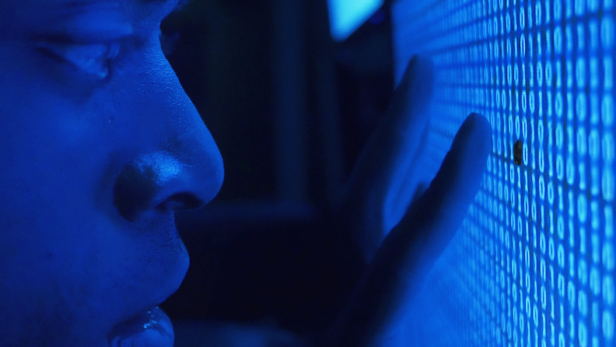At the beginning of CTRL, Christian Lex (Saabeah Theos) and her boyfriend Dru (Hainsley Lloyd Bennett) are heading to the luxurious fifth-storey apartment of Lex’s brother Leo (Julian Mack), a reclusive computer geek with a strong streak of misanthropy, to celebrate his birthday. As the couple ascends, floor by floor, we hear Leo reciting (in voice-over), one after another, the “five laws to create something from nothing’, as though this were a modern-day Book of Genesis. Dru is surprised to discover that Lex’s brother, unlike Lex herself, is white, and that Lex was adopted. “They found me in a basket among the reeds,” jokes Lex of her (now deceased) parents, continuing the Biblical metaphor. Dru and Leo are similarly contrasted by the colour of their skin, and their combative interactions are expressed in the black-and-white arena of a chess board (both a literal one, and the distinctive tiling of the apartment’s floor), with the game-playing Leo always seeming to be several moves ahead of his guest.
In fact, Leo has been working on creating an apocalyptic computer virus, copies of which he distributes to fellow hackers at his birthday party, each one wearing masks that both conceal and reveal their antisocial nature (Leo himself is dressed as the sociopathic Alex from Stanley Kubrick’s A Clockwork Orange). The virus is called ‘DAISY’, figured as the female creation of the solipsistic, lovelorn Leo. It is a name encrypted as an acrostic by Leo’s ‘five rules’. It is also, significantly, the lyric repeatedly sung by murderous supercomputer HAL as he is shut down near the end of another Kubrick, 2001: A Space Odyssey. Wordplay abounds in CTRL: insects, created from nothing, flutter about, anagrammatising the implied incest between the similarly named Lex and Leo while reifying the bugs that are a hacker’s stock in trade (we also at one point see actual webs spread between the circuitboards of Leo’s sophisticated web-browsing equipment).
When the virus is unleashed, Leo, Lex, and Dru find themselves trapped together in an uneasy ménage à trois, as Daisy locks the apartment’s security door and starts aggressively creating her own imitations of life for this new Paradise. The virus, evolving rapidly, takes many forms, and gets everywhere – in the air, in the water, under the skin – but perhaps it has always been there, in its human hosts. After all, “We are the virus”, declares Leo early in the film. Here, as the digital becomes organic, and humans behave according to deterministic algorithms, CTRL locates religious transcendence in the technological singularity.
Though its events are confined to a small domestic space, the film is full of thematic ambition, wallpapering itself in the imagery of a serpent, a tree of life, a plague of locusts and a virgin birth as it upgrades the coding of the Old and New Testaments for a new wired world. By the end, it has become hard here to disentangle the literal from the metaphorical, or to tell if this is a scenario more from Jean-Paul Sartre’s existential play No Exit (Huis Clos) – famed for its line “Hell is other people” – or from Donald Cammell’s technophobic shocker Demon Seed.
Written, directed, shot and edited by Harry Lindley, this bold feature debut yields disorienting (mind and) body horror, negotiating our fragile relationship with each other in a life increasingly lived online and electronically enhanced, where identity – even humanity – are open to radical redefinition.
CTRL was seen and reviewed at Arrow Video FrightFest 2018.
